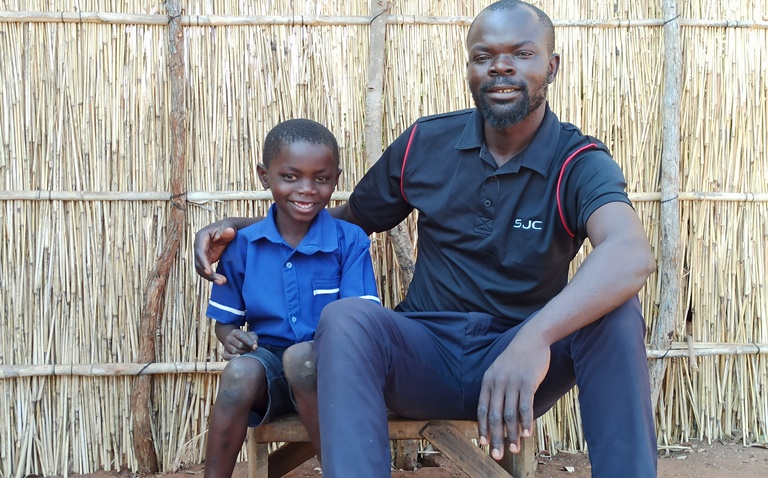Saving babies in absence of breast milk
Breastfeeding practices such as early initiation of breast milk and exclusive breastfeeding remain key to the reduction of childhood morbidity and mortality.
Despite the importance of these practices, rates of timely initiation of breastfeeding and exclusive breastfeeding remain suboptimal in many sub-Saharan countries including Malawi.

As some children are denied their right to be breastfed by their mother due to personal reasons, some are robbed of this opportunity by death of the mother after giving birth to them.
Lazarus Kaseleka from Traditional Authority Kalonga in Salima district is a father of two. His first wife died immediately after birthing their first child.
She never held her child let alone breastfed him within the first one hour after birth as recommended by the World Health Organisation (WHO).
Kaseleka was advised by the nurse to go and buy formula milk (Lactogen) for the just born baby, and as he rushed to Kaphatenga Trading Centre, his heart was heavy and tears kept running from his eyes.
He could not believe what had happened, a new born baby and a lifeless partner who once shared plans with him of bringing up the child together.
He said: “I got the milk. At that time it was at K2 500 per tin and it lasted for three days. So each week I was supposed to get two tins and spend K5 000 on milk.”
To make ends meet and provide for the child, he then started burning and selling charcoal.
Explained Kaseleka: “Whenever I had enough money, I managed to buy four tins of milk at once but when there was no money, I had to find milk on credit.”
Two months went by and one day, one of his friends told him about Kindle Orphan Outreach, a non-governmental organisation which runs Katawa Community Clinic in the area and offers help to people in situations like his.
Kaseleka said he never wasted time and went to Kindle to express his ordeal. When he narrated his story to them, he finally saw light at the end of the tunnel.
Kindle agreed to be giving his baby the formula milk under the Kindle nutrition special needs programme.
Baby Lyton was registered in the programme and after six months, he stopped taking the milk.
He said: “Lyton is now six years old and goes to school. He is a healthy child and I am thankful to Kindle. I thought my baby was going to die but here he is. When I look at him, I see my reflection and a symbol of faith.”
He encourages those who are going through the same situation as he did six years ago, to have faith and look for help where necessary.
Evelyn James from Mwalala Village, Traditional Authority (T/A) Kalonga in the same district said her story is quite different from that of Lazarus.
She gave birth to a child two years ago and as a fourth time mother, she knew the baby had to be breastfed within the first one hour after birth.
The baby, however, could not suck her mother’s breasts because she was born with a condition called cleft palate she had to stay without feeding for a day.
Being from a poor background, she could not afford even a single tin of the formula milk and it took officials from Salima District Hospital to link her up with Kindle Orphan Outreach and they helped.
She said: “Aside the milk, Kindle helped us with surgeries and my daughter can now eat properly, drink tea and is growing healthily.
Kindle Orphan Outreach executive director Joseph Kandiyesa said the aim of the program is to support children with special needs such as orphan infants, children born with health problems like cleft palate and hydrocephalus, premature babies, mothers who don’t produce milk among others.
He said: “Any other condition that makes a child fail to feed is recommended for the programme. So far about 1 000 children have been reached out through the programme. The major achievement is that the programme has saved many children from death and it restores joy and hope to the guardians of these children.”
Aside the Lactogen given to the child, the affected families are helped with psychosocial counselling and seed for agricultural activities.
Added Kandiyesa: “This is because due to the loss of their relative, they find themselves in an unexpected situation of having the responsibility of taking care of a child or children left by the deceased which in most cases leaves families psychologically affected.
“We also support the affected families with maize seed, soya and fertilizer and guardians are taught on how to make nutritious foods and prepare the meals with soya flour and general health living.”
He, however, mentioned that the rising cost of commodities like milk and the inputs given to the families have affected the noble gesture.
Currently, the organisation relies on help from a German missionary called Vereinigte Deutsche Missionshilfe (VDM) to meet the demand of services which is just too high under the nutrition project.
Child rights activist Amos Chibwana has however, hailed initiatives meant to save the lives of children who are born with various medical conditions and lost their mothers within their first hours or days on earth citing any help rendered is precious.
He said these children grow up to be independent and reliable citizens who contribute to the development of the nation and that collaboration should be intensified to make sure no child dies even when they did not have the chance of experiencing breastfeeding.
WHO reports that an estimated 78 million babies or three in five are not breastfed within the first hour of life, putting them at higher risk of death and disease and making them less likely to continue breastfeeding.





